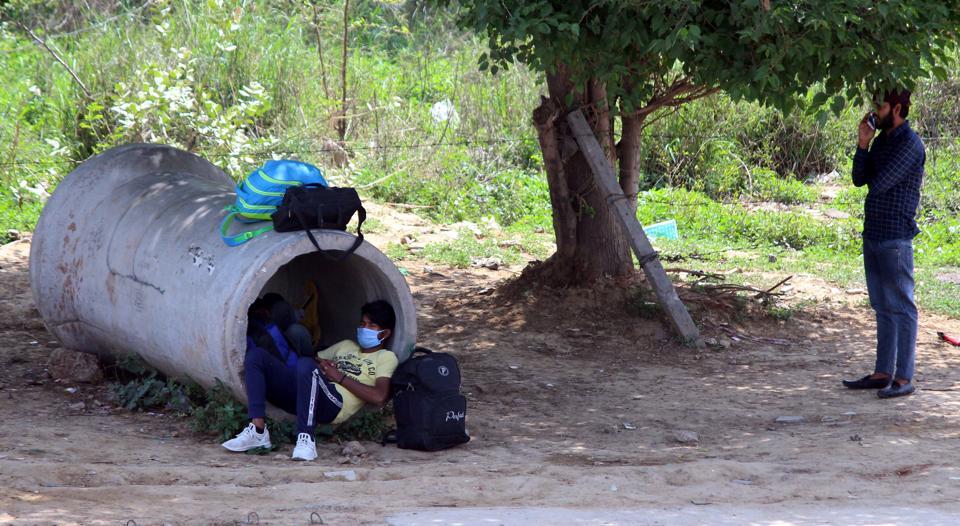prasad1
Active member
Last week, I called up Nagaraj. Until the lockdown came about, Nagaraj used to come regularly at 6 am and clean our car. Besides wanting to know how to transfer his month’s wages to him, I was keen to know how he was. Nagaraj told me that conditions were tough; getting food and other essentials was difficult, and there was no work. But that was still bearable, he said. His real misery was that he had to spend 24 hours a day, everyday, cooped up with the five other members of his family in one room. I could almost hear him cry, talking about it.
That’s when it struck me that while the lockdown is hard for everyone, the ones who are miserable, in a different way, are the urban poor. What’s new, you may ask? But just think about how precious it is for every individual to have a little private space, even if for a limited time.
For the urban upper-and middle-class, it’s not too bad. Most people today stay in a flat. Families are not too large either — a couple and one or two kids (though some are larger, with parents/in-laws/ relatives living together as well). But there is still some place in the flat to hide oneself for some time; the tiny balcony, the small entrance-way or even the storeroom. So, in some sense, they can sneak in a private moment. And then there is the building complex to stroll around in. There is some corner, some terrace, some stairwell, some scooter or car park, to find a quiet space.
In rural India, it’s even easier. Just step out to the field or orchard at the back, behind a large tree or on a quiet path.
But it’s the urban lower-middle-class and poor who face the maximum brunt of this aspect of the lockdown. For people such as Nagaraj, being stuck with five other people — sure, family members — in a single room the whole day and night is suffocating. Even when you step outside the slum, where do you go? There are people all around who know you, and who you feel are looking at you. After some time, everyone is irritating you, and you are irritating everyone.
As the lockdown continues and could extend again, either continuously or intermittently, society needs to find ways to help people find privacy. Lockdown systems have to take this into account to reduce the misery, and not just the economic plight, of people most affected. Technology can help, such as by automatically permitting to move around on a rotational basis, while being safe so that social distancing is maintained. That way, people can find a quiet space for a short time, at least.
In the long-term, we need to think even more about our public places in urban areas, and how we can make them more hygienic, more comfortable, and more inspiring, recognising that for most urban Indians, it’s not really a public place, it’s your most private place.

 www.hindustantimes.com
www.hindustantimes.com
That’s when it struck me that while the lockdown is hard for everyone, the ones who are miserable, in a different way, are the urban poor. What’s new, you may ask? But just think about how precious it is for every individual to have a little private space, even if for a limited time.
For the urban upper-and middle-class, it’s not too bad. Most people today stay in a flat. Families are not too large either — a couple and one or two kids (though some are larger, with parents/in-laws/ relatives living together as well). But there is still some place in the flat to hide oneself for some time; the tiny balcony, the small entrance-way or even the storeroom. So, in some sense, they can sneak in a private moment. And then there is the building complex to stroll around in. There is some corner, some terrace, some stairwell, some scooter or car park, to find a quiet space.
In rural India, it’s even easier. Just step out to the field or orchard at the back, behind a large tree or on a quiet path.
But it’s the urban lower-middle-class and poor who face the maximum brunt of this aspect of the lockdown. For people such as Nagaraj, being stuck with five other people — sure, family members — in a single room the whole day and night is suffocating. Even when you step outside the slum, where do you go? There are people all around who know you, and who you feel are looking at you. After some time, everyone is irritating you, and you are irritating everyone.
As the lockdown continues and could extend again, either continuously or intermittently, society needs to find ways to help people find privacy. Lockdown systems have to take this into account to reduce the misery, and not just the economic plight, of people most affected. Technology can help, such as by automatically permitting to move around on a rotational basis, while being safe so that social distancing is maintained. That way, people can find a quiet space for a short time, at least.
In the long-term, we need to think even more about our public places in urban areas, and how we can make them more hygienic, more comfortable, and more inspiring, recognising that for most urban Indians, it’s not really a public place, it’s your most private place.

When your private space is actually a public space
For millions in urban India, it is the street, the marketplace, or the public transport that offers moments of privacy
